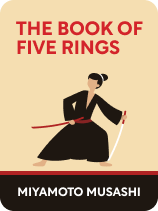

This article is an excerpt from the Shortform book guide to "The Book of Five Rings" by Miyamoto Musashi. Shortform has the world's best summaries and analyses of books you should be reading.
Like this article? Sign up for a free trial here .
What can you learn from reading Miyamoto Musashi’s The Book of Five Rings? Can any of the 17th-century lessons be useful in the modern-day?
In The Book of Five Rings, Miyamoto Musashi divides the book into five chapters: Ground, Water, Fire, Wind, and the Void. Musashi’s lessons are meant to teach aspiring samurai warriors the Way. Additionally, Musashi’s lessons are so universal that they can still be applied today.
Here’s a brief overview of the key themes.
Book Overview
In The Book of Five Rings, Miyamoto Musashi (1584-1645), one of Japan’s most famous Samurai warriors, shares his principles for any aspiring warrior wishing to know the true Way of Japanese swordsmanship. Musashi claims that those who know the true Way are invincible in combat, arguing that it is strategy and discipline, not brute strength or innate ability, that make a successful warrior. Although a product of 17th-century Samurai culture, some of Musashi’s key principles can still be used by the modern reader in their personal and professional lives. In this overview, we will explore the key principles in each of the five “books,” or chapters, and examine their modern relevance.
The Ground Book: Musashi’s Fundamentals of the Way
The Ground Book introduces some of the most important aspects of Musashi’s Way. We can group these core fundamentals into three categories: Know your discipline, use your tools well, and be flexible, patient, and disciplined.
Fundamental #1: Know Your Discipline
Musashi believes that you must thoroughly learn about your discipline before you can put your knowledge into practice. Musashi also strongly believes that while the teacher can facilitate learning, it’s the student’s responsibility to put what he learns into practice. Musashi repeatedly warns that this is not a quick or easy process: He urges his reader to tirelessly study “day and night,” as Musashi himself claims to have done for decades.
| Student-Centric Learning: Then and Now While ideas around the importance of student-centric learning have gained increasing prominence in recent decades, versions of this approach have existed for many centuries. Socrates (470-399 BC) and his Socratic Method is perhaps the most famous example in the Western tradition. There are also current pedagogical methods aimed at creating student-centric learning even for very young children, such as the Montessori Method, which takes as one of its founding principles the idea that the child should follow their own interests and abilities, with the teacher offering individualized guidance and support instead of just a one-size-fits-all curriculum that all students must follow. |
Fundamental #2: Use Your Tools Well
Musashi says that an essential part of strategy is knowing how to use tools and resources well. This component of strategy is twofold: You must begin by knowing the tools and weapons you have available and how best to apply them in any situation.
- Step #1: Know your tools. Assess what resources and skills you have (personal skills, environmental factors, material assets, and so on).
- Step #2: Know how best to apply your tools and resources. Analyze the situation and determine which of your tools and resources will serve you best under the circumstances—not every tool or resource will be equally valuable in every context.
(Shortform note: Musashi’s advice about knowing your resources and tools and making the best use of them requires being creative and flexible in discovering how best to use them to achieve your goals. Similarly, today some life coaches advocate creating a “life resource” list to help you figure out which resources you can use in whichever situation, personal or professional, you may find yourself in. A “life resource” list covers multiple areas, such as mindset, skills, support systems, and knowledge.)
Fundamental #3: Be Flexible, Patient, and Disciplined
Musashi teaches that a successful warrior is, above all else, flexible, patient, and disciplined. Developing these key qualities depends on the following factors:
- Flexibility: Identify your “transferable skills” and learn how to apply your knowledge and skills to different contexts.
- Patience: Always be detail-oriented. Musashi argues that even small things can have big impacts.
- Discipline: Commit yourself to constant training, and have an all-or-nothing attitude toward success.
(Shortform note: Musashi’s advice to avoid becoming dependent on particular conditions or settings in order to succeed applies to today’s continuously evolving workplace. Transferable skills are becoming increasingly valuable, especially since the number of workers looking to switch their roles or industries has risen dramatically. An article by Forbes even argues that workers who switch jobs frequently may be more successful in the long run than those who remain within the same role or company long term.)
The Water Book: Training Body and Mind
Musashi says that the ideal warrior is like water: flexible and adaptable. Just as water can change its form (liquid, solid, gas) and take on the shape of whatever container it’s poured into as a liquid, so too must the ideal warrior learn how to adapt to any situation through cultivating the right mental and physical approach. The right approach rests on three factors: absorbing rather than memorizing, training the body and mind together, and cultivating self-control.
Don’t Memorize—Absorb
Musashi repeatedly warns that reading The Book of Five Rings will not automatically make someone a great warrior. It is not enough to simply know the principles of the Way—you must absorb the principles on a deeper level, incorporating them into your very essence. This is not a quick or easy process: You must be patient and disciplined, as there are no shortcuts apart from constant study and training.
| Making Knowledge and Skills “Second Nature” When Musashi urges his readers to absorb his principles instead of merely memorizing them, he does so for two reasons. First, this is in keeping with Musashi’s student-centric approach more generally. Since true knowledge is active and not passive, the aspiring warrior must always seek ways of making the knowledge truly his own before putting it to use. Second, by fully absorbing knowledge, the warrior increases his chances of applying it more effectively in real-world situations, even while under pressure in combat situations. The modern concept of “muscle memory” also claims that making something instinctive and automatic is both a mental and physical process. Muscle memory refers to the way in which repetition while learning a skill or performing a task helps to forge new neural pathways in the brain, allowing the process to eventually become physically and/or mentally automatic. |
Train Body and Mind Together
Musashi believes that being a great warrior has both mental and physical aspects. The body and mind must work together for success. Training body and mind in sync involves maintaining good posture, staying calm under pressure, and learning how to be perceptive—the true warrior doesn’t just see things, he learns how to perceive everything around him and weigh its importance accordingly.
(Shortform Note: Scientific studies have identified direct links between mental and physical well-being, reinforcing the idea that the body needs to be approached holistically. In fact, we’re relearning what most of the world already understood—that the body and mind are connected—up until the 17 century, when the Western world began to view the body as separate and machine-like with independent parts.)
Cultivate Self-Control
Musashi says the warrior must master himself before he attempts to control others. In developing self-mastery, the warrior avoids falling prey to nerves or lack of skill when fighting an enemy. Furthermore, self-control makes the warrior both a successful individual and an effective leader: By embodying the qualities and skills you wish to see in your team, you will inspire others to follow your example.
(Shortform note: The idea of self-control as a crucial component for success in life has had a long pedigree in both the East and West. For example, Stoic philosophers, such as Seneca and Epictetus, urged their followers to cultivate an inner tranquility that would prove unshakeable regardless of external factors. Modern research also suggests mindfulness can help you develop better self-control. In taking time to learn how to center yourself and regulate your mind, you can make strengthening your self-control a part of your daily routine.)
The Fire Book: Individual and Collective Combat
Musashi discusses how to apply your training in both one-on-one and large-scale combat in The Fire Book. When faced with a real-life challenge or enemy, the warrior must keep three principles in mind: awareness and adaptability, the essentiality of always taking the initiative, and how to apply strategies on both large and small scales.
Principle #1: Maintain Awareness and Adaptability
- Know Your Environment: Take note of everything in your environment that could help or hinder you, and adjust your plans accordingly to maximize your advantages.
- Think Like Your Competitor: Learning to think like the enemy enables you to anticipate potential tactics the enemy might use, while also making it easier to evaluate your own position more objectively.
- Adapt Your Strategies Whenever Necessary: If you discover one tactic isn’t working during combat, you must immediately switch to a different strategy.
(Shortform note: In urging readers to know their environment, think like their competitor, and adapt their strategy to the circumstances, Musashi demonstrates that adaptability is, fundamentally, a certain type of mindset that is applicable to all three areas. Some experts claim there are certain qualities that determine how adaptable a person will be: flexibility, curiosity, emotional intelligence, focus on opportunities, interpersonal skills, being proactive, and cultivating a positive mindset.)
Principle #2: Be Proactive, Not Reactive
Musashi emphasizes that the successful warrior is proactive and not reactive. The single greatest advantage you can have is to always take the initiative. For Musashi, this is one of the most crucial aspects of strategy. A warrior who has learned how to carefully perceive his environment and who demonstrates a willingness to change tactics—as discussed above—will always know the best way to gain the upper hand.
(Shortform note: Stephen Covey lists being proactive as his first “habit” in The 7 Habits of Highly Effective People. Covey argues that people who are proactive are happier and more successful in life, because feeling in control allows you to respond more calmly to setbacks and to learn more readily from failure. Being proactive also boosts overall mental well-being and motivation, which in turn increases your chances of success. Covey argues that learning to understand what you can and can’t control, learning from mistakes, and actively shaping your self-image are all strategies you can use to become more proactive in your life.)
Principle #3: Apply Strategy on Both Large and Small Scales
Musashi argues that a truly solid strategy works on both large and small scales in combat, which is why a warrior trained in the true Way will be able to apply his knowledge and skills regardless of what sort of battle he fights. Musashi urges his reader to always keep this in mind while training and even in one-to-one combat: The strategies that can help you win against one man can help you win against a whole army.
(Shortform note: An article for the Harvard Business Review notes that flexibility isn’t just about mindset or strategy, but also about execution. So it’s important to recognize common pitfalls that can interfere with executing your company’s plans effectively, such as inflexibility, creating plans with too many steps, refusing to adapt your plans, and relying too much on data. You can also learn how to become more personally flexible at work through cultivating your sense of optimism, calmness of mind, and training yourself to plan ahead.)
The Wind Book: Knowing Your Competitor
In the Wind Book, Musashi critiques the combat approaches of some of the rival Samurai schools of his day. In a modern context, two of Musashi’s principles remain important: understanding your competitor’s strategies and relying on skill over strength for victory.
Understand Your Competitor’s Strategies
Musashi argues that it’s never enough just to thoroughly know your own strategies during combat: To outwit your competitor and strengthen your own position, you must first thoroughly understand what their strategy is. You must observe your competitor’s strengths and weaknesses and their circumstances, and try to anticipate their next move.
(Shortform note: Musashi urges the warrior to observe the enemy carefully to outwit him and gain the upper hand in combat. Similarly, in the fifth book of The Art of War, Sun Tzu also outlines tactics for determining your enemy’s position and outmaneuvering them in combat. Sun Tzu’s advice includes always taking the initiative, determining your enemy’s weak spots, adapting your tactics when needed, and favoring speed.)
Use Skill Over Strength
Musashi argues that strength alone never determines the outcome of combat: It’s the smartest and most skillful warrior who wins—brute strength alone is never enough. By relying on his skills and knowledge of strategy, the warrior will be able to win even against the strongest of enemies.
| Skill Trumps Strength in Combat and Sports While the Samurai have ceased to exist as an active force, Musashi’s insistence on the superiority of skill and strategy over brute strength still applies to some modern martial arts contexts. Martial artist Lawrence A. Kane argues that skill is more important than strength in martial arts. It is, however, also interesting to note that some studies show that cognitive strategies in sports can affect strength in athletes. These strategies include setting goals, mental preparation, and visualization, and some correlation has been observed between the use of these strategies and increased strength performance. Such research suggests that while Musashi might not see strength as a determining factor in combat or competition, it can nevertheless be a positive by-product of the sort of mental discipline he advocates. |
The Book of the Void: Achieving Physical and Mental Harmony
Musashi suggests that the “Void” is a state of spiritual enlightenment, in which you find the virtue and wisdom that make up the true Way of the warrior. To discover the Void and access it at will during combat, you must do two things: Seek to develop deep knowledge of all things, and constantly train and put the principles you’ve learned into practice.(Shortform note: In speaking of “the Void” and its importance for the warrior, Musashi draws upon a key concept in Zen Buddhism known as “sunyata.” Sunyata is the state in which your sense of self becomes immersed in the five skandhas, or elements, of existence: form, sensation, perception, mental formations, and consciousness. Achieving sunyata leads to mental and physical harmony through the abandonment of an egotistical, individualistic notion of “self,” allowing the warrior to become one with his environment.)

———End of Preview———
Like what you just read? Read the rest of the world's best book summary and analysis of Miyamoto Musashi's "The Book of Five Rings" at Shortform .
Here's what you'll find in our full The Book of Five Rings summary :
- Insights from the famous Samurai Miyamoto Musashi about the Way of the Warrior
- How to apply Musashi’s teachings to your personal and professional lives
- Why success is not based on brute strength or innate talent






